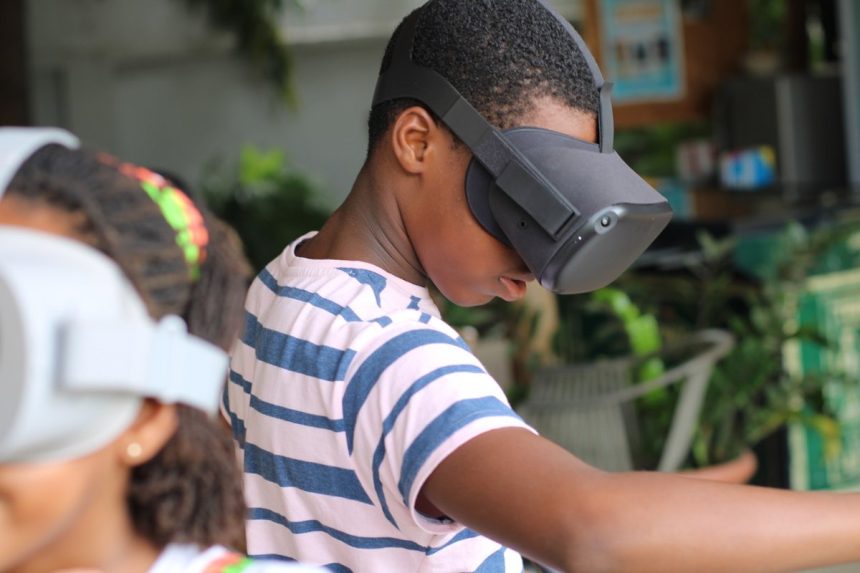Globally, approximately 61 million children are unable to attain primary education; this translates into fewer children making it into secondary education. More so, in Africa, when it comes to the quality of education children receive in school, much room for improvement still exists.
A global study conducted by the UNESCO Institute of Statistics (UIS) indicated that 617 million school goers were not acquiring the minimum reading and mathematical skills.
In Ghana, this challenge is compounded by the poor access to educational materials, huge class sizes, and inadequate facilities to drive curriculum lessons; Science education suffers the most given that it is heavily reliant on resources to drive understanding. Ghanaian startup, Nubian Virtual Reality Technology (NubianVR), in collaboration with the UNICEF Innovation Fund is designing and testing virtual reality learning tools to improve the process of teaching and learning in junior high schools; with a particular focus on Science Education.
NubianVR is a UNICEF Innovation Fund supported startup that has built capacity in research, design, and development of virtual reality teaching and learning materials. It is led by Kabiru Seidu, a 28-year-old Ashesi University graduate with a team of researchers, designers, developers, content creators, and educators. NubianVR, seeking to engage with the problems affecting the teaching and learning of Science, undertook research to better understand the context of peri-urban schools, identify their problems, and possibly come up with initiatives to assist them.
Between June – August 2019, NubianVR undertook research in one of the peri-urban education districts in Ghana, the Ga-East district located in the Greater Accra Region. Over the course of this research, the NubianVR team visited 66% of the total number of public junior high schools (JHS) in the district and had guided interviews with the science teaching staff at these schools.
The difficulty in teaching science in Ghanaian junior high schools arose from teaching practicals as there are inadequate Teaching and Learning Materials (TLMs) and a lack of science labs. Any activity which involved demonstration, audiovisuals, experiments, and model designs proved to be hard as the students could not visualize what the teacher was teaching on.
“Experiments are the most difficult activity to perform because of lack of materials, and improvisations do not bring the best demonstrations,” a teacher from the Taifa Circuit commented.
The teachers expressed concerns that teaching in abstract made comprehension by students difficult thus creating a massive gap in content retention and application when the need arose.
NubianVR treated teachers to three VR educational experiences; as most of them had not used the technology before. These experiences demonstrated varied types of learning approaches; ranging from passive 2D & 360 videos to experiences’ that required interactivity. This engagement was followed by interviews that asked for teachers’ opinions on gamification as a teaching tool; they agreed that it would enhance learning since students enjoyed games as a way of learning. Teachers welcomed this move by NubianVR and suggested vital topics that could benefit from this approach of teaching such as basic electronics, circulatory system and elements of the periodic table.
Armed with the knowledge of topics that teachers’ struggled to teach, NubianVR took on the challenge to develop a virtual reality lesson that allows teachers and students alike to learn basic electronics using interactive demonstration, animated 2D video lessons, 360 visualization, adaptive exercises, and game-based strategies. This will be tested with teachers and students in January and February 2020 respectively. Beyond this, the company is looking forward to expanding the technology to include other subject areas and modules.
Presently, the cost of VR technology has been falling. Just like smartphones, VR devices equally benefit from the exponential growth in price-performance; for example, in 2015, the portable Oculus VR device — i.e. Samsung GearVR — cost US$700; fast-forward to now the Oculus Go, a significantly superior device, costs US$200.
NubianVR is currently working with educators, district education representatives and developers to create content that will be used to conduct a pilot in schools by mid-2020.
Despite welcoming VR as a learning intervention, educators expressed a few concerns such as the cost of the technology, electricity and internet unavailability. NubianVR, recognizing these challenges, is exploring deployment models that will enable schools to circumvent these whilst awaiting the eventual fall to a relative optimum for the cost of VR technology.
Presently, the cost of VR technology has been falling. Just like smartphones, VR devices equally benefit from the exponential growth in price-performance; for example, in 2015, the portable Oculus VR device — i.e. Samsung GearVR — cost US$700; fast-forward to now the Oculus Go, a significantly superior device, costs US$200.

Moving on, NubianVR is calling on all educational stakeholders such as donors, government, teachers, and parents to look forward to the trials and results with schools in the Ga-East District in partnership with the Ga-East GES.
The implementation of VR learning in the classroom is in line with Sustainable Development Goal 4; which calls for inclusive, equitable, and quality education. Achieving the SDG educational target is critical to the attainment of the 2030 Agenda for Sustainable Development and essential for the success of all SDGs.
You can follow NubianVR’s journey by subscribing to their Medium publication Making NubianVR. For more information, contact kabiru@nubianvr.com










